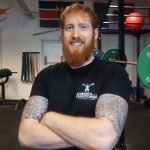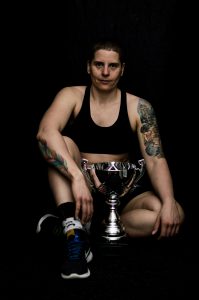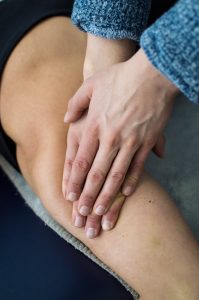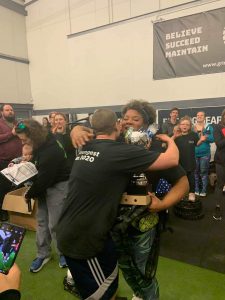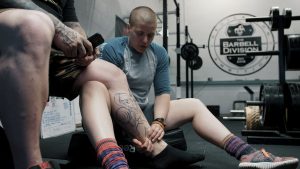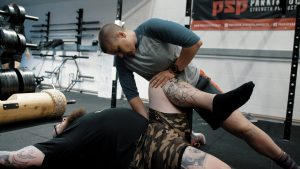INTRODUCTION
Hey, welcome to our tenth Meet the Expert blog.
In this blog, we interview expert coaches and athletes, delving into what makes them tick, what drives them to keep going, and what they believe to be the pitfalls and keys to success.
Let’s get to it!
Question 1: What is your name, age and where are you from?
Amy Linford, Age 36, from Southampton.
Question 2 (Therapist): What is your occupation? Is it what you are known for or completely separate? What jobs have you done in the past?
Manual Therapist – I look after strongmen, powerlifters as well chronic pain and rehabilitation.
Question 2 (Athlete): What is your sport and at what level do you compete?
Strong woman – current U82kg UK Strongest Woman.
Question 3 (Therapist): What is your primary area of expertise and why are you passionate about it?
I specialize in Applied Movement Neurology, using the feedback system and central nervous system to help treat my patients and improve their current situations, whether it is wanting to lift more overhead or being able to stand out of their wheelchair and walk a few steps unaided.
Why am I passionate about it? Because everyone should have a chance to be at their best and reach the levels that they want to without being held back by an old recurring injury or an accident that got them to be in front of me.
I have spent many years watching people invest in themselves with the wrong coach, fad exercise routines they have seen on social media, pills, and potions that they believe will get them where they want to be, or a new piece of equipment that promises the world only to fail – unsurprisingly.
Rather than just rolling my eyes and moaning about it, I decided to act. Learn as much as I possibly can to be a source of knowledge to help, rather than fail my, people.
Question 3 (Athlete): How did you get started in the sport? Why did you choose that sport? Did you, or do you compete in other sports?
Basically, it was a dare. I did my first comp, loved it, and decided that I wanted to see what I was actually capable of.
I had competed in other sports at a high level – hockey and running – which left me needing to have a full knee reconstruction just before my 30th birthday, so the sports that I had committed 15 years of my life to, I was no longer able to do. I loved training and being competitive, so I was lost for a little while, as my knee got better, but then one day in the gym, an old school strongman challenged me to deadlifting with his client, and I managed to walk away unscathed, and that was when he dared me to a comp. Not one to back down, I dived in, and that was the start of that. Aaron took me on as one of his athletes, and we took care of each other in both training and events whilst demanding excellence all along the way.
Question 4 (Therapist): How did you get started doing what you do?
I first started out as a Gym Instructure and Personal Trainer in a well-known health club. I walked the floor, did the cleaning, did the hours did the CPD, taught the classes had the clients, did a good job with retention too but I felt there was something lacking from the support I could offer and what my clients needed. I didn’t want to refer them out, I wanted to offer them the whole journey, so I embarked on more courses until I found the one that resonated with me. That is where I found Faster Global and learned about using mechanics in therapy to get people moving with efficient intention as quickly as possible. I loved it, but it still left me with more questions, so I dug deeper and did more work with manual therapy to learn hands-on treatments. With what I had learned about movement mechanics in sports, I was able to combine manual therapy with that and see better results with athletes. I wanted to use my skills elsewhere, so I began offering to work with patients that had suffered from strokes and other brain alignments to get them moving again and self-sufficient. This was when I really felt alive and that I had found my thing, the thing I wanted to learn and become. And that was when I started my journey with Applied Movement Neurology. The results for my patients came thick and fast. I couldn’t learn and implement things fast enough. Just brilliant, and now I feel like I am in a place where I can offer help to most that want to be better.
Question 5 (Therapist): What are your weaknesses? What hurdles did you face and how did you overcome these barriers?
I am still working on how to market myself better and get the clear message out that I am here to help. In-person, that is where I shine, getting people to know who I am, what I do, and how I can help – a big weakness for me.
Question 5 (Athlete): What are your weaknesses? What hurdles did you face and how did you overcome these barriers?
Squats are my weakness – after going through all the rehab and getting it to a place I can hit fairly heavy loads again, I just want to work the groove and walk away safely. Other than that, I love the rest so just go for my life, do my best, and have a laugh. I never put any pressure on myself or have expectations, I just want to have fun and do my best. Sometimes I win and sometimes not, but I always learn something for next time.
Question 6 (Therapist): What are your biggest strengths, both as a coach and an individual? What do you believe to be the primary reasons for your success? What do you consider to be your biggest success so far?
As a coach, I want my people to succeed and be proud of what they have done, and for that, they need a strong foundation – that is my strength. I am giving people a solid, consistent base to work from. As an individual, I am resilient. Mental strength has allowed me to overcome some massive barriers, as we have recently, and keep ploughing on but also when to ask for help.
The primary reasons for my success aren’t sexy at all. Working hard and never letting go of the dream. When it gets really tough, go away and do something fun for a few minutes and then come back to it.
Biggest success so far (I am going to take 2 because it is hard to choose) – Going to Giants Live with Aaron Page. I was backstage with him while he smashed his events, and this led to the best year and him being invited to Worlds Strongest Man.
Helping a client to be able to walk and stand without aid after being in a wheelchair for 12 years. That was totes emosh.
Question 6 (Athlete): What are your biggest strengths, both as an athlete and an individual? What do you consider to be your biggest success so far?
Mental toughness and being ok with being uncomfortable. Knowing where my limits are, building up to them, and staying there, so it becomes familiar is part of what I do every day, so when I need to call on my experiences, I know I can survive what is ahead of me.
Having a wholly plant-based diet means I struggle to gain a lot of muscle mass, but the advantages of recovering faster between events and having better CV fitness allows me to have a bigger buffer with maximum efforts. Also, part of the head game when the sport is dosed with performance-enhancing drugs and choosing not to follow that path. Nutrition is hard when you need to hit weight, be strong, have mass to counterbalance, and doing all these whilst fuelled on plants. Arguments with my coach about it almost weekly, but standing strong in my own belief and values is more important than winning a competition.
Biggest success so far – winning UK strongest woman 2020.
Question 7 (Therapist): Where do you think a lot of people go wrong and what general pieces of advice would you give to those looking to excel in areas similar to yours?
I think a lot of people go wrong because they chase the money and lose their integrity along the way. We, as an industry, have to fight the unregulated undercharging wrongness that is thrown at people all the time on social media. We have a responsibility of client care and to keep ourselves up to date with the latest research rather than popular trends. Stick to your lane and make a network around you. You cannot fix every problem for every person with 6 weeks of training and no experience. Be humble, learn from experts and value your customers. They are people, not pound signs.
Question 7 (Athlete): Where do you think a lot of athletes go wrong and what general pieces of advice would you give to those looking to excel in sport?
Lack of consistency with training, nutrition, recovery and sleep. I did that too when I was young and thought I could just run things off or survive on 2 hours of sleep, using exercise as punishment for bad planning.
Rest and recover as if your life depends on it – future you will thank you.
Get a coach that understands you, what you want and works with you rather than someone that wants a slice of the pie.
Work hard.
Don’t worry about what anyone else is doing. Focus on you.
Question 8 (Therapist): Are there any rules or quotes that you live by?
You will not always be the best in the room, but you should definitely aim for top 3.
You do not know everything so don’t pretend that you do. Be honest and true to yourself, and the right people will come.
Trust the journey and be patient.
Question 8 (Athlete): Are there any rules or quotes that you live by?
Don’t think – Just do.
Question 9 (Therapist): What are your plans for the near future? What goals do you currently have?
Right now, I am writing a methodology that I will be launching this year, combining all the things I have to be able to help bring clarity to the muddy waters of self-rehab. It is pretty exciting.
Question 9 (Athlete): What are your plans for the near future? What goals do you currently have?
Now I am focusing on building up my core strength, flexibility, and body control – training in events can’t happen, so I am doing everything I can to be strong all over so when we can start again, I will be ahead of the curve.
The near future, I don’t really know. Aaron passed away in November, and all of my plans were with him, so I need to decide if I continue his legacy and go to Brits for the title he wanted me to get, or if I back down and wait to see what happens and come back as a master in a few years.
Question 10 (Therapist): Where do you see yourself in 5 Years? What is your ultimate goal?
To have a fully funded clinic for those that need it so the NHS can offload some of their long-term patients and some world-class athletes on my books – just because they are fun to work with.
I will also run events/retreats a couple of times a year.
Question 10 (Athlete) Where do you see yourself in 5 Years? What is your ultimate goal?
Honestly, I don’t know yet. 2020 was both the best year – winning a title – and the worst – losing my friend, mentor, and coach – and I need to just be with that for a while before I make permanent plans. I know his mum wants me to go and win everything I can with a memento of Aaron with me, so I need to think about that.
I will do something, but what, I do not know right now.
CHECK OUT AMY’S CONTENT
Facebook: @freedomtherapylinford
Instagram: @amypainwhisperer
A WORD FROM THE AUTHOR
Wow, this one was packed full of inspiration, I really enjoyed reading the answers and putting the blog together.
I am looking forward to watching Amy’s career progress, both as a therapist and athlete. She has some fascinating concepts, and I am keen to see how her methodology evolves.
I remember hearing about Aaron Page’s death in the gym and was greatly saddened to hear that such a great athlete within the Strongman community had passed. It is a real credit to his name that athletes like Amy are keen to carry on his legacy!
If you are keen to feature in our Meet the Expert Blog and Newsletter, drop us an email to [email protected] and we will send you an intro pack.
Coach Curtis
